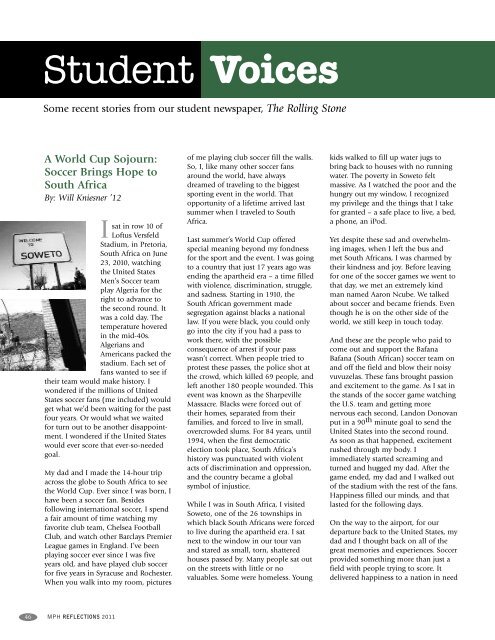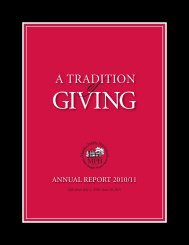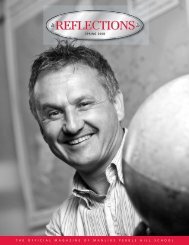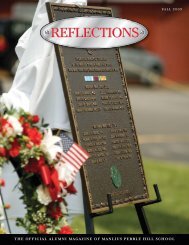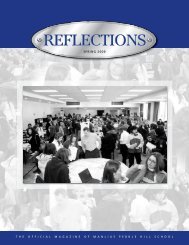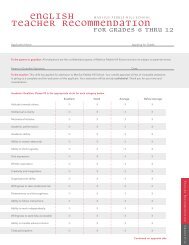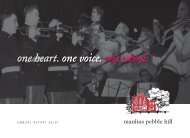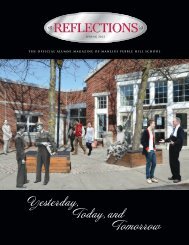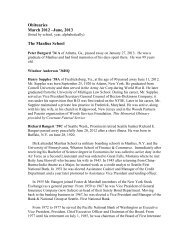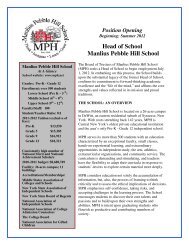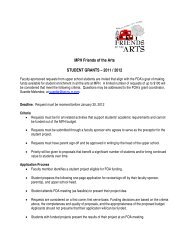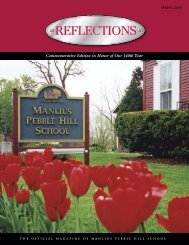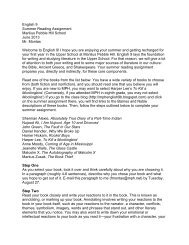Spring 2011 - Manlius Pebble Hill School
Spring 2011 - Manlius Pebble Hill School
Spring 2011 - Manlius Pebble Hill School
Create successful ePaper yourself
Turn your PDF publications into a flip-book with our unique Google optimized e-Paper software.
Student VoicesSome recent stories from our student newspaper, The Rolling StoneA World Cup Sojourn:Soccer Brings Hope toSouth AfricaBy: Will Kniesner ’12Isat in row 10 ofLoftus VersfeldStadium, in Pretoria,South Africa on June23, 2010, watchingthe United StatesMen’s Soccer teamplay Algeria for theright to advance tothe second round. Itwas a cold day. Thetemperature hoveredin the mid-40s.Algerians andAmericans packed thestadium. Each set offans wanted to see iftheir team would make history. Iwondered if the millions of UnitedStates soccer fans (me included) wouldget what we’d been waiting for the pastfour years. Or would what we waitedfor turn out to be another disappointment.I wondered if the United Stateswould ever score that ever-so-neededgoal.My dad and I made the 14-hour tripacross the globe to South Africa to seethe World Cup. Ever since I was born, Ihave been a soccer fan. Besidesfollowing international soccer, I spenda fair amount of time watching myfavorite club team, Chelsea FootballClub, and watch other Barclays PremierLeague games in England. I’ve beenplaying soccer ever since I was fiveyears old, and have played club soccerfor five years in Syracuse and Rochester.When you walk into my room, picturesof me playing club soccer fill the walls.So, I, like many other soccer fansaround the world, have alwaysdreamed of traveling to the biggestsporting event in the world. Thatopportunity of a lifetime arrived lastsummer when I traveled to SouthAfrica.Last summer’s World Cup offeredspecial meaning beyond my fondnessfor the sport and the event. I was goingto a country that just 17 years ago wasending the apartheid era – a time filledwith violence, discrimination, struggle,and sadness. Starting in 1910, theSouth African government madesegregation against blacks a nationallaw. If you were black, you could onlygo into the city if you had a pass towork there, with the possibleconsequence of arrest if your passwasn’t correct. When people tried toprotest these passes, the police shot atthe crowd, which killed 69 people, andleft another 180 people wounded. Thisevent was known as the SharpevilleMassacre. Blacks were forced out oftheir homes, separated from theirfamilies, and forced to live in small,overcrowded slums. For 84 years, until1994, when the first democraticelection took place, South Africa’shistory was punctuated with violentacts of discrimination and oppression,and the country became a globalsymbol of injustice.While I was in South Africa, I visitedSoweto, one of the 26 townships inwhich black South Africans were forcedto live during the apartheid era. I satnext to the window in our tour vanand stared as small, torn, shatteredhouses passed by. Many people sat outon the streets with little or novaluables. Some were homeless. Youngkids walked to fill up water jugs tobring back to houses with no runningwater. The poverty in Soweto feltmassive. As I watched the poor and thehungry out my window, I recognizedmy privilege and the things that I takefor granted – a safe place to live, a bed,a phone, an iPod.Yet despite these sad and overwhelmingimages, when I left the bus andmet South Africans, I was charmed bytheir kindness and joy. Before leavingfor one of the soccer games we went tothat day, we met an extremely kindman named Aaron Ncube. We talkedabout soccer and became friends. Eventhough he is on the other side of theworld, we still keep in touch today.And these are the people who paid tocome out and support the BafanaBafana (South African) soccer team onand off the field and blow their noisyvuvuzelas. These fans brought passionand excitement to the game. As I sat inthe stands of the soccer game watchingthe U.S. team and getting morenervous each second, Landon Donovanput in a 90 th minute goal to send theUnited States into the second round.As soon as that happened, excitementrushed through my body. Iimmediately started screaming andturned and hugged my dad. After thegame ended, my dad and I walked outof the stadium with the rest of the fans.Happiness filled our minds, and thatlasted for the following days.On the way to the airport, for ourdeparture back to the United States, mydad and I thought back on all of thegreat memories and experiences. Soccerprovided something more than just afield with people trying to score. Itdelivered happiness to a nation in need46 MPH REFLECTIONS <strong>2011</strong>


